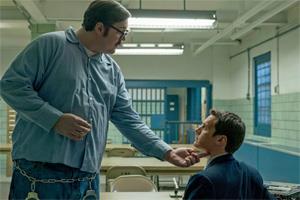Harkening back to pivotal gestation periods, conventional TV networks and latter-day streamers have offered quite an education lately for those who want to enroll.
Earlier this year, FX’s Snowfall began dramatizing the origins of crack cocaine, circa Los Angeles in the early 1980s.
On the heels of that, HBO’s The Deuce offered a Porn 101 course, circa New York City in the early 1970s.
Beginning on Friday, Oct. 13 -- which is pretty creepy already -- Netflix’s Mindhunter (originally commissioned by HBO) offers an extreme closeup of how the FBI’s criminal profiling practices began in earnest. This one starts in the late 1970s but is not confined to one locale. Disparate agents Holden Ford (Jonathan Groff, top, from Broadway’s Hamilton, Spring Awakening) and Bill Tench (Fight Club alum Holt McCallany, top) instead journey far and wide. Both are based on real-life characters drawn from the John E. Douglas book Mind Hunter: Inside the FBI’s Elite Serial Crime Unit.

Netflix has been extra-vigilant with Mindhunter, making just the first two of Season One’s 10 hours available while also requiring a signed agreement to hold reviews until the day before the series launches. Also, no major “spoilers” -- or else.
In this case, the limitations are tolerable because Mindhunter’s principal maestro is heavy hitter David Fincher (in partnership with Charlize Theron), who put Netflix on the original programming map in a big way with House of Cards. He’s also directed the feature films Fight Club, Gone Girl, Zodiac, Se7en, The Girl with the Dragon Tattoo, The Social Network and The Curious Case of Benjamin Button among others. So attention must be paid.
Se7en and Zodiac also mined the serial killer terrain. In Mindhunter, Ford (TV and filmdom’s latest mockup of Douglas) initially uses the term “sequence killer” in Episode 2 during one of his prison interviews with convicted “Co-Ed Killer” Edmund Kemper. More on him later.
Fincher certainly, and sometimes unsteadily, takes his time with all of this. The 29-year-old Ford, a veritable Dudley Do-Right in dark suits and white shirts, is straitlaced to the point of being figuratively wrapped in a tourniquet, He’s first seen trying to talk down a shotgun-brandishing nut who’s holding a woman hostage and believes he’s invisible. The venue is “BRADDOCK, PENNSYLVANIA” (all of the locales are spelled out in screen-filling white block letters). And the outcome isn’t ideal, even if Ford’s stern, Quantico-based boss, Shepard (the durable Cotter Smith), says otherwise.
Ford then is reassigned to teach classes in hostage negotiation at Quantico’s FBI Academy, where he preaches that “we must establish communication. Non-threatening communication.” He’s also increasingly consumed with the psychological motivations driving killers to do what they do without any easily discernible motives. “It’s a different era. No more ‘Just the Facts, ma’am,’ “ a fellow instructor tells him.
En route to these awakenings, Ford has a chance meeting in a bar with the comparatively worldly Debbie (Hannah Gross), who’s studying for a Ph.D. in sociology. Their getting-to-know-you dialogue is clipped and sometimes awkwardly so. It’s also blemished by Ford’s “Wait! What?” reaction when Debbie pulls him onto the dance floor. There’s a scripting epidemic of this lately, with Ford later reacting with a “What! Why?” in Episode 2. I’m pretty sure that neither line was in usage during the late ’70s. But whatever the case, let’s retire them along with the cable news networks’ addictions to ’“Double down” and “We’ve got a lot to unpack here.”
Ford and Tench don’t hook up until late in Episode One, via another chance meeting in the FBI cafeteria. The flinty vet (based on real-life agent Robert K. Ressler) is looking for someone to go on the road with him and help teach local police officers about the fine arts of investigation. This is when Mindhunter starts to pick up the pace, with the two agents both clashing and commiserating in a manner somewhat reminiscent of True Detective’s stellar first season.
During a stop in Fairfield, Iowa, Ford rankles both Tench and veteran, former L.A. detective Frank McGraw (Muse Watson) by stressing the importance of understanding that Charles Manson’s very traumatic upbringing contributed heavily to his “Family’s” famed killing spree.
“Circumstances affect behavior,” Ford preaches before Wench later gets off one of Mindhunter’s better lines: “You need to know who you’re talking to before you tell a sob story about little Chucky Manson.”

But Ford remains undeterred in his zeal to understand the current-day criminal mind. During a stop in San Francisco, he arranges an interview with the aforementioned Edmund Kemper (a superbly nuanced and chilling performance by Cameron Britton, left), an outwardly gentle, bespectacled giant of a killer whose grotesque murders of college co-eds are fully detailed in Mindhunter but won’t be here.
“It’s not easy butchering people. It’s hard work,” says Kemper, who was a real-life serial killer and also the product of an abusive mother in his telling.
Tench initially wants no part of this, playing golf instead while Ford keeps returning for more helpings of Kemper. But he eventually comes around, in a rather predictable manner. And the two agents are kindred spirits upon returning to Quantico to tell Shepard about their breakthroughs.
“It is not our job to commiserate with these people. It is our job to electrocute them,” he barks, angrily, before threatening Ford in particular with censure, followed by suspension, followed by transfer.
It’s left for Tench to save the day with the money quote from both a previously released Mindhunter trailer and also of these first two episodes: “How do we get ahead of crazy if we don’t know how crazy thinks?”
Oh, all right then. But their little hobby can take up only 10 hours of their 50-hour work weeks.
At this point, Mindhunter is finally rolling. And in real-life, John E. Douglas (on whom Ford is modeled, remember) interviewed a whole passel of convicted killers, including Manson, David Berkowitz, Ted Bundy, John Wayne Gacy, Richard Speck, James Earl Ray, and Sirhan Sirhan in efforts to divine their madnesses.
Mindhunter already has been picked up for a Season 2, so expect most if not all of these murderers to factor in at some point. A Netflix publicist assures that Ford and Tench also will be putting their newfound findings to use by doing some sleuthing of their own before the end of Season 1.
Patience is recommended because it takes a while for Mindhunter to embed its hooks and acclimate Groff, who at times seems to be almost painfully “finding” his character after a career based largely in musical theater and as a recurring character in Glee. The weekly opening credits likewise are slow-moving, musically nondescript and mainly consist of various tight shots of a vintage tape-recorder. But the closing credits rock, particularly with the Talking Heads’ “Psycho Killer” playing off Episode 2.
Netflix could have, and probably should have, made more episodes available for review. Based on what we have, Mindhunter is plodding at times but promising in the main. And given the still fresh wounds of the mass Las Vegas killings, there’s more need than ever to get inside the minds of a growing list of heinous perpetrators.